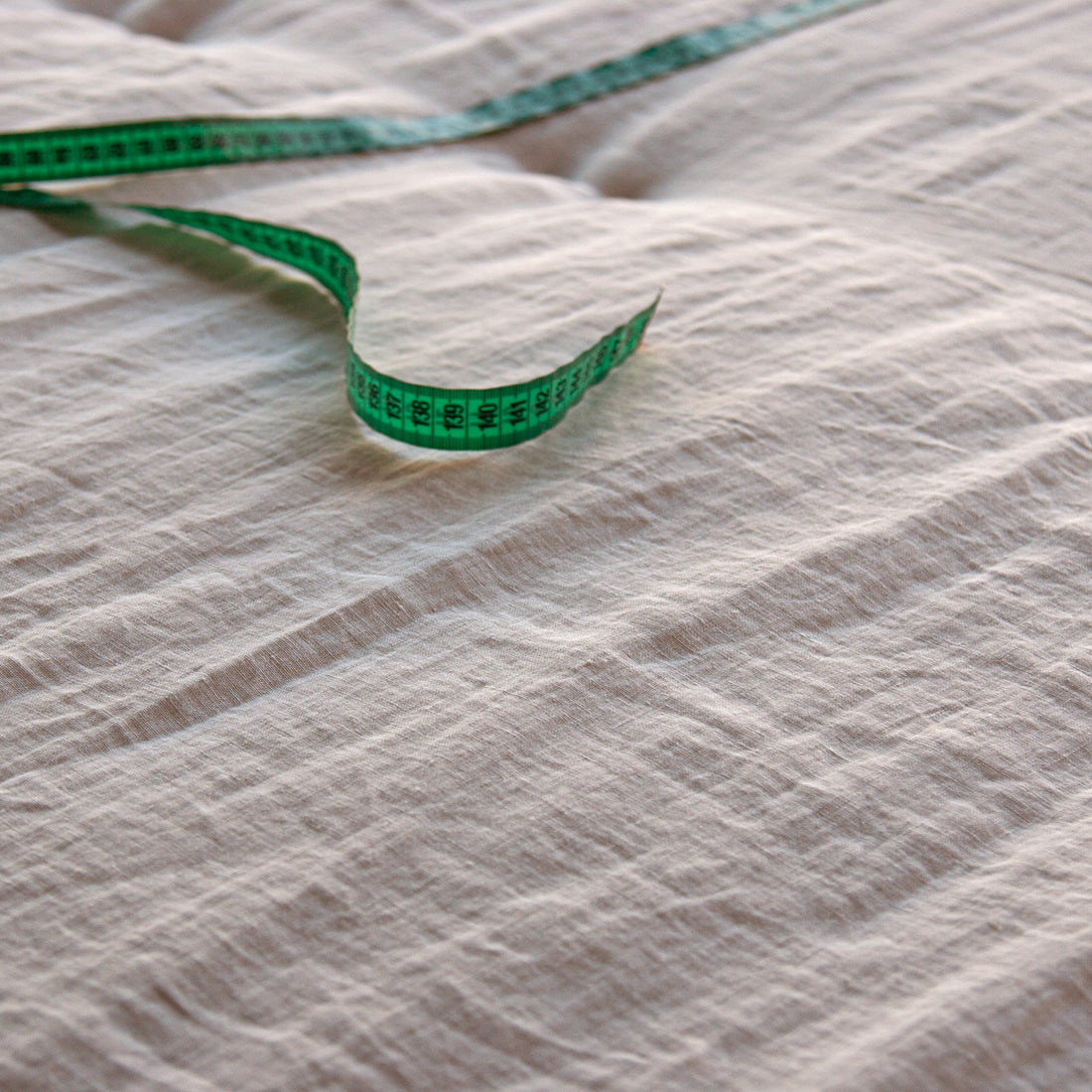What is the difference between linen and cotton?

We thought it would be interesting to write this week about the difference between linen and cotton. Many people bet on cotton because of its price and its apparent quality, but in this post we are going to see what the most important differences between them are. Don't miss them at Delenzo!
Linen and cotton fabric, natural but different
You may be thinking that linen and cotton, being natural fibers, are similar fabrics in quality, texture, drape... but in reality, they are more different than you think.
Let's start talking about the characteristics (in environmental terms) of the cotton fabric:
- Cotton is a fabric of natural origin, but it is not one of the most sustainable neither with the environment nor with its production (chemical substances are used in cultivation such as fertilizers and pesticides)
- When they use chemical substances, they must use much more water and, consequently, there is a very high level of contamination in the water.
- As there is a lot of demand for cotton (it accounts for half of the textile industry), the plant is beginning to be genetically modified. More and more land is needed to cultivate...it's not very sustainable.
Next, we are going to comment on its properties as a fabric:
- It has a high absorption power but, when it gets wet, it weighs a lot and takes a long time to dry.
- It is hypoallergenic and breathable, but it is not insulating, which means that it is not thermo-regulating, it does not insulate you from heat or cold.
- The fiber is not very resistant or elastic, but it is cheap.
Linen, a sustainable fabric
Now we will talk about flax, its characteristics and properties as a fabric. Compared to cotton, linen is much more sustainable but, it is true that it is much more noticeable in the price, both if you are a company and buy raw material and for the consumer when you buy a product made with linen.
Let's see it in more detail, let's comment on the characteristics (in environmental terms) of linen fabric:
- Flax is obtained from a plant, it is 100% natural. The flax plant is very grateful, it could survive without irrigation water (only rainwater) and without the need for chemical substances. The plant does not attract pests.
- It is very easy to incorporate into crop rotation cycles, since to process said plant and transform it into tissue, not much energy is needed.
- Like cotton, it is mainly made up of cellulose.
- It is said that linen is also very sustainable because the entire plant is used both for fabric and for insulation material as well as for food.
- It is 100% recyclable and 100% biodegradable.
More differences between linen and cotton
Next, let's learn a little more about the qualities of linen fabric:
- Compared to cotton, when a linen garment gets wet it does not weigh and its drying capacity is much greater than that of cotton
- Like cotton, linen is breathable and suitable for people with allergies or skin problems, but, linen IS RESISTANT to tears, it can last for many years (Of course, you have be careful with the snags, that can cause breakage)
- Linen is thermo-regulating, perfect for any season of the year and also insulates you very well from the external temperature so that you can rest (in the case of bedding) wonderfully.
- Compared to cotton cloth, linen does not retain odors for that reason, it is said to be hygienic.
What to choose, linen or cotton?
Choosing linen or cotton will depend a lot on what you are going to use it for, buying a cotton t-shirt is not the same as buying a beach towel or bedding. We, as we are dedicated to selling 100% washed linen bedding and home textiles, will always refer to products for the home.
If you want a fabric that is resistant and durable over time, the linen fabric is the one you should choose since the fiber of linen is considered one of the strongest. You have to keep in mind that when you buy linen you are buying a fiber that is natural and, as we say, it is a fiber that has life...so, you have to be patient if you see that it releases fluff because it is something normal in linen And, if you see that a product for the home does not release fiber, it means that it has been treated with chemicals so that it does not do so and that, that is not natural.
To use linen, you have to be in love with its beautiful wrinkle, if on the contrary, you have a mania or you have to be ironing every two to three because you can't see a single wrinkle....you should know that linen it's not for you. Although our products for the home are made of washed linen, the natural wrinkle will remain and that, you should know before buying a piece of linen.....and if not, don't you think that cotton is a better option? for you?
Buying linen fabric means having a sustainable, hygienic and cool fabric to better tolerate high summer temperatures while you sleep.Linen may be perfect for you if you are a warm person who usually sweats at night while you sleep, since linen fabric has great absorbent power that keeps the sheets dry and, it is also a thermo-regulating fabric, it will always keep your body temperature to offer you the best rest
Linen bedding VS cotton bedding
At this point we are going to make a summary of the most important things to consider before choosing linen bedding or cotton bedding.
Let's start with the linen bedding:
- The linen for bedding does not lose its shape after washing, on the contrary, it becomes softer and softer as you use and wash it and with the passage of time it becomes softer. nice.
- If you use linen for the bed you will notice that the sheets are lighter, but that does not mean that they do not keep you warm. They will always maintain your body temperature thanks to their thermo-regulating property.
- Linen for the bed is indicated for people with atopic, sensitive and allergic skin... It is very hygienic!
- The linen bedding can be expensive, right? (depends on who values it) but linen is one of the most sustainable and natural fabrics that exist on the market today. In addition, it is a durable and resistant fabric.
- Linen fabric keeps you cool in summer and warm in winter, so you can wear it all year round!
- Washed linen bedding eliminates humidity, especially in coastal areas. Do you remember that feeling of getting into bed and feeling the sheets wet from the humidity? With linen, that doesn't happen.
Next, let's rate the cotton sheets:
- They also wrinkle quite a bit and the wrinkle isn't as pretty, but ironing makes it easier to remove the wrinkle.
- Cotton does not have as much tear resistance compared to linen sheets.
- Cotton sheets can be very soft, like washed linen, but compared to linen, they don't absorb the same percentage of moisture.
- Cotton sheets are breathable, like linen sheets.
- Cotton is not considered a sustainable natural fiber, unless you buy organic cotton.
And you, which one do you prefer?
.



